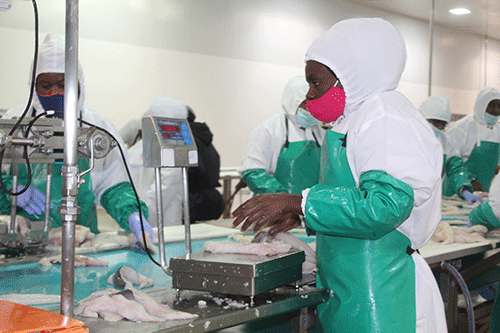WALVIS BAY – The small pelagic industry has said the true state of the pilchard fishery may never be known as the current research methods do not give a clear indication on the recovery of the stock.
This follows after the latest research conducted in April by the fisheries ministry, in partnership with Etosha Fishing, showed zero biomass, meaning no pilchards were detected. No quota will thus be issued anytime soon by the ministry.
Ironically, schools of pilchards swimming in shallow waters were accidently caught in April this year by a mullet right holder, and abandoned at Independence Beach. The small pelagic industry has been facing challenges since a moratorium was placed on pilchards in 2017.
The three-year moratorium came to an end in December 2020. However, the ministry is yet to pronounce itself on the future of the small pelagic industry.
Government enforced the ban to aid the recovery of pilchards after low catches were detected. To date, there is no clear indication whether pilchards recovered or had been depleted. The ministry uses the hydroacoustics method, which is sonar technology, and is most commonly used for the monitoring of underwater physical and biological characteristics.
The ministry is getting more information from these operators, and will issue a statement on the findings.
Etosha Fishing managing director Nezette Beukes last week confirmed to New Era that the last research they conducted with the ministry indeed showed zero biomass. “The research was definitely disappointing as we were hoping that the pilchards had recovered. However, the methods that we used during the research are outdated. We hope that the second research will yield more positive results,” Beukes added.
Etosha is one of the three companies which were harvesting pilchards for canning in the past. However, due to low catches and the moratorium, they were forced to import pilchards from Morocco to sustain jobs. They were further aided
by the ministry with a horse mackerel
quota to avoid job losses.
The spokesperson of the fisheries ministry, Uaripi Katjiukua, yesterday indicated that the ministry has through its Resources Management Directorate conducted a stock assessment on the pilchard sub-sector in order to determine the biomass. “The research determined that the resource has not recovered. Another study on the state of the stock was carried out during the horse mackerel and small pelagic survey in April 2022. It was yet again determined that the resource
had not recovered and as such, no total allowable catch has been determined for pilchards yet,” Katjiukua said.
However, she denied that the method used by the ministry to assess the stock is outdated, but is accurate.
According to her, the ministry prides itself in engaging in reliable and accurate research methods that have been used over the years. Meanwhile, ecologist and environmental scientist from the
Chamber of Environment Chris Brown earlier proposed to the ministry to study the status and breeding success of
seabirds, which are pilchard predators.
“The status and breeding success of these birds provides a far more effective, reliable and sensitive indicator, and
at a fraction of the cost than can be achieved by scientists sampling from a research vessel,” he submitted.
– edeklerk@nepc.com.na


